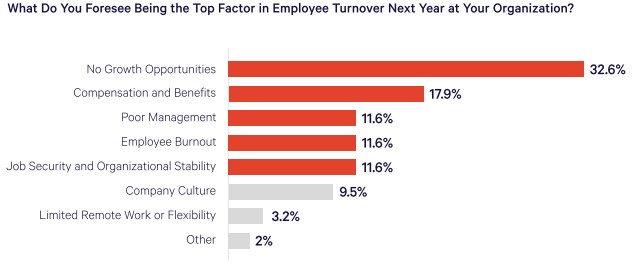In today’s competitive job market, employees are not just looking for a paycheck; they’re seeking opportunities for growth and advancement. If you were to ask your team members if they feel your company provides sufficient avenues for career progression, would the answer be a resounding yes? Or would they express a desire for more structured career development programs, opportunities to upskill, and clear pathways for advancement?
A concerning statistic from McKinsey reveals that a significant 41% of employees have left their jobs due to a lack of career advancement prospects. This isn’t news to HR and Learning & Development professionals. In fact, Together’s report, “Enterprise L&D in 2025: Predictions and Trends”, forecasts that limited career growth will be a leading driver of employee turnover in the coming years.
This chart illustrates the understanding among HR and L&D experts regarding the significant impact of limited career growth opportunities on employee attrition rates.
The challenge is clear: employees crave growth. But how do you effectively address this need and implement robust career advancement programs? This article will serve as your guide, exploring the essence of career development programs, providing actionable steps on how to implement them successfully, and showcasing inspiring examples from companies that have thrived through their commitment to employee growth.
Understanding Career Development Programs
At its core, a career development program is a strategic framework designed to align employee skills, aspirations, and developmental needs with both current and future opportunities within an organization. It’s about proactively investing in your employees’ professional journeys, setting them up for success not just in their current roles, but throughout their entire careers with your company.
These programs are multifaceted and can encompass a variety of initiatives, including:
- External Certifications and Training: Supporting employees in gaining industry-recognized certifications or participating in specialized training courses to enhance their expertise.
- Conferences and Seminars: Providing opportunities to attend industry events, conferences, and seminars to stay abreast of the latest trends, network with peers, and expand their knowledge base.
- Internal Mobility Programs: Creating pathways for employees to move laterally or vertically within the organization, gaining experience in different roles and departments.
- Mentorship and Coaching: Pairing employees with experienced mentors or coaches who can provide guidance, support, and insights to aid their career progression.
- Skill-Based Workshops: Offering targeted workshops focused on developing specific hard and soft skills crucial for career advancement.
- Peer Learning Initiatives: Facilitating peer mentorship programs and knowledge-sharing platforms where employees can learn from each other’s experiences and expertise.
Career development is generally viewed as an ongoing, on-the-job process, deeply integrated into the employee lifecycle. It’s distinct from academic career development, which involves formal courses at academic institutions, and bootcamps, which are intensive, short-term programs focused on specific hard skills for upskilling or career transitions. Whether it’s upskilling employees in their current roles or reskilling them for new career paths within the company, career development programs are a strategic investment in your workforce’s future.
The Crucial Importance of Career Development Programs
For HR and L&D professionals, the value of talent development is self-evident. It’s not merely a retention tactic, but a fundamental strategy for building a more robust, engaged, and adaptable workforce. Effective employee training is a significant undertaking, but the returns are substantial.
Here are key benefits that underscore the importance of implementing career development programs:
Boosting Employee Retention
Career development is a powerful tool for enhancing employee retention rates. By demonstrating a commitment to employees’ growth, companies can cultivate loyalty and reduce turnover.
💡 Remarkably, 94% of employees indicate they would remain at their current company if there was investment in their career development, according to a LinkedIn Learning report. This statistic highlights the profound impact career growth opportunities have on employee loyalty. Investing in employee development strengthens your employer brand and fosters a positive company culture, leading to long-term employee commitment.
Facilitating Upskilling and Reskilling
In a rapidly evolving business landscape, continuous learning is paramount. Career development programs empower employees to stay ahead of industry trends by providing avenues for reskilling and upskilling. This proactive approach ensures your workforce possesses the skills needed for future roles and evolving company needs.
Often, this means organizations can cultivate talent from within, filling new or changing roles by developing existing employees. This strategy significantly reduces hiring costs and onboarding time, as internal candidates already possess valuable company knowledge and cultural understanding.
Nurturing Leadership Development
Career development programs are instrumental in cultivating future leaders. Strategically designed programs can hone crucial leadership skills, such as decision-making, strategic thinking, and cross-functional collaboration. Through initiatives like high-potential leadership programs, companies can proactively build a strong leadership pipeline.
Integrating a dedicated leadership development program ensures a steady stream of capable leaders ready to guide the company through future challenges and opportunities, equipping both emerging and current managers with the skills to drive success and navigate change effectively.
Real-World Examples of Successful Career Development Programs
To inspire your own program implementation, let’s examine successful career development initiatives from various companies:
1. Marriott International
Marriott International stands out for its significant investment in early career development programs, yielding impressive results. Their hotel internship programs bridge the gap between academic learning and practical industry experience, offering recent graduates hands-on training from seasoned experts. Furthermore, the Voyage Leadership Development Program provides both new and current employees with discipline-specific management skills while expanding their professional networks.
2. Workday
Workday employs a skill-centric HR strategy, empowering employees to identify and pursue specific skill development goals. Their career development program connects employees with opportunities to collaborate with diverse teams across the organization, fostering skill acquisition and broadening career perspectives. Since its inception in 2021, Workday’s program has garnered overwhelmingly positive feedback from participants.
3. Randstad
Randstad, a global leader in HR services, effectively utilizes professional mentoring programs for employee development. By meticulously tracking participant turnover rates and employee engagement, Randstad witnessed a remarkable 49% reduction in turnover and a more engaged, motivated workforce. This data clearly demonstrates the tangible benefits of mentorship in career development.
4. Ethena
Ethena, a company specializing in interactive compliance training, exemplifies how smaller organizations can integrate core values into their career development initiatives. Ethena provides employees with full access to their comprehensive course catalog, ranging from DEI and unconscious bias training to leadership and role-specific skills development. This commitment to holistic employee development aligns directly with their company values.
5. Aflac
Beyond their well-known duck mascot, insurance giant Aflac is recognized for its robust career development programs. Aflac’s Career Success Centers offer employees personalized career counseling sessions to explore their professional aspirations and chart achievable paths within the company.
Aflac’s career advancement initiatives include diverse programs and events, such as Career Insights sessions, providing employees with direct access to leadership across different departments. These sessions offer invaluable insights into the skills and knowledge required for success in various roles within the organization.
6. Accenture
Accenture, a global IT and professional services company, demonstrates a significant commitment to employee development, investing nearly $1 billion USD annually in career programs. Accenture focuses on ensuring employees’ skills remain cutting-edge in a rapidly changing industry. From supporting external certifications like Salesforce and AWS to offering leadership training and specialized industry skillset development, Accenture provides extensive learning and growth opportunities across all levels of the organization.
Numerous companies are achieving impressive outcomes through strategic career development programs. Explore further examples of leading company training programs here.
Best Practices for Building an Effective Career Development Program
Now that you understand the “what” and “why,” let’s delve into the “how.” Here are key strategies for implementing a successful and impactful career advancement program within your organization:
1. Define Your Target Audience
Begin by identifying which employee segments your program will serve. Will it focus on early-career professionals, high-potential employees earmarked for leadership, or underrepresented talent groups? Understanding your target audience is crucial for tailoring program content, learning formats, and relevant topics to their specific needs and career stages.
2. Co-Create Individual Development Plans (IDPs)
Implement Individual Development Plans (IDPs) that are jointly created by managers and employees. An individual development plan ensures a personalized approach, focusing on each employee’s unique career aspirations and developmental needs.
Instead of overwhelming employees with generic course catalogs, IDPs offer a structured, personalized roadmap for achieving both short-term and long-term career goals while enhancing current job performance. The IDP process should be a collaborative partnership between managers and employees, emphasizing continuous feedback and proactive planning.
3. Integrate Mentorship Programs
Establish a robust workplace mentorship program to pair employees with experienced mentors. Workplace mentorship provides invaluable support, particularly for junior employees, and can even benefit senior executives through reverse mentorship initiatives.
Career mentors play a vital role in guiding mentees to define their career goals and providing actionable strategies for achieving them. Integrating a comprehensive mentoring program into your broader career development strategy offers enhanced support for employees seeking to excel, fostering stronger engagement and company-wide loyalty.
Empower Employee Growth Today
A well-structured career development program is not merely a retention strategy; it’s a cornerstone of building a future-ready, high-performing workforce.
These programs empower employees to hone their skills in current roles, navigate upward mobility (or explore a career lattice approach), and explore diverse career paths within your organization.
Providing employees with the right tools and support is essential for their professional flourishing. Platforms like Together’s mentoring software streamline the creation and management of career advancement programs, simplifying administration for HR and enhancing convenience for program participants.
Discover how Together’s mentoring software can empower your career development program – book a demo today.


